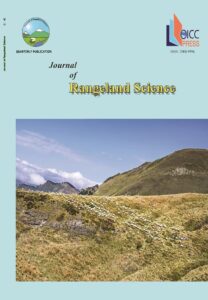Modeling the Limitative Factors of Forage Production Suitability Using GIS (Case Study: Aliabad Rangelands, Lorestan, Iran)
Authors
Abstract
This research was conducted to identify the limitative factors of forage production
suitability in order to achieve the sustainable exploitation of natural ecosystems in Aliabad
Watershed in Lorestan in 2013. The field measurements have been done through cutting and
weighing method to estimate the forage amount, four-factor method to determine the range
condition, trend scale to specify the orientation and appearance, the plant cover percent
measurement to categorize the types and desert scroll to separate the land units followed by
the classification. At last, all the digital maps of type, orientation, condition and forage
production by the help of integration were changed into the final forage production suitability
map using specific software ArcGIS 9.3. Results indicate that 6 separated vegetation types
have been put in the suitability classes of S1, S2 and S3 for the areas of 972 ha (20.02%),
3478 ha (71.62%) and 406 ha (8.36%), respectively and no part of the given rangelands was
placed in non-suitability class (N). Considering the results obtained from final suitability
model of range production in this study, it has been found that high slope was the most
restricting factor of range suitability. In addition, there were other decreasing factors such as
low percentage of vegetation, overgrazing, early grazing, nonconformity of livestock and
rangeland balance and changes of ranges into low-yielding dry lands’ farming as well as
forage production. It was concluded that the accuracy, simplicity and quickness can be
considered as fundamental elements to determine the range suitability using Geographical
Information System (GIS) which has been addressed in this study.



